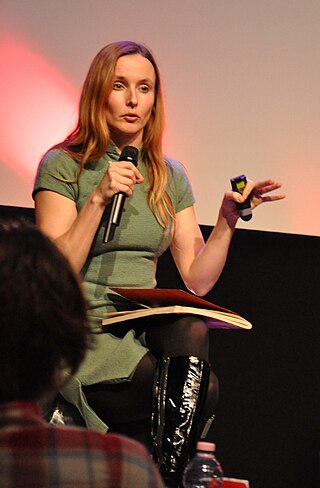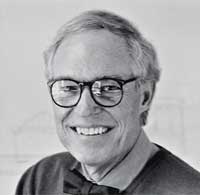
Frederick Phillips Brooks Jr. was an American computer architect, software engineer, and computer scientist, best known for managing the development of IBM's System/360 family of computers and the OS/360 software support package, then later writing candidly about those experiences in his seminal book The Mythical Man-Month.

Howard G. Cunningham is an American computer programmer who developed the first wiki and was a co-author of the Manifesto for Agile Software Development. A pioneer in both design patterns and extreme programming, he started coding the WikiWikiWeb in 1994, and installed it on c2.com on March 25, 1995, as an add-on to the Portland Pattern Repository. He co-authored a book about wikis, entitled The Wiki Way, and invented the Framework for Integrated Test.

Skidmore, Owings & Merrill LLP (SOM) is an American architectural, urban planning and engineering firm. It was founded in 1936 by Louis Skidmore and Nathaniel Owings in Chicago. In 1939, they were joined by engineer John Merrill. The firm opened its second office, in New York City, in 1937 and has since expanded, with additional offices in San Francisco, Los Angeles, Washington, D.C., London, Melbourne, Hong Kong, Shanghai, Seattle, and Dubai.

William Grant Moggridge, RDI was an English designer, author and educator who cofounded the design company IDEO and was director of Cooper Hewitt, Smithsonian Design Museum in New York. He was a pioneer in adopting a human-centred approach in design, and championed interaction design as a mainstream design discipline. Among his achievements, he designed the first laptop computer, the GRiD Compass, was honoured for Lifetime Achievement from the National Design Awards, and given the Prince Philip Designers Prize. He was quoted as saying, "If there is a simple, easy principle that binds everything I have done together, it is my interest in people and their relationship to things."
Wilson McLean is a Scottish illustrator and artist. He has illustrated primarily in the field of advertising but has also provided cover art for music albums, sports magazines, a children's book, and other commercial endeavors.

Alex Ross is an American music critic and author who specializes in classical music. Ross has been a staff member of The New Yorker magazine since 1996. His extensive writings include performance and record reviews, industry updates, cultural commentary, and historical narratives in the realm of classical music. He has written three well-received books: The Rest Is Noise: Listening to the Twentieth Century (2007), Listen to This (2011), and Wagnerism: Art and Politics in the Shadow of Music (2020).
John Nelson Warfield was an American systems scientist, who was professor and director of the Institute for Advanced Study in the Integrative Sciences (IASIS) at George Mason University, and president of the Systems, Man, and Cybernetics Society.

Arthur Fry is an American inventor and scientist. He is credited as the co-creator of the Post-it Note, an item of office stationery manufactured by 3M. As of 2006, Post-it products are sold in more than 100 countries.

Natalie Jeremijenko is an artist and engineer whose background includes studies in biochemistry, physics, neuroscience and precision engineering. She is an active member of the net.art movement, and her work primarily explores the interface between society, the environment and technology. She has alternatively described her work as "X Design" and herself as a "thingker", a combination of thing-maker and thinker. In 2018, she was Artist in Residence at Dartmouth College, and is currently an associate professor at New York University in the Visual Art Department, and has affiliated faculty appointments in the school's Computer Science and Environmental Studies.
Donald Tobias Wong was a Canadian designer and artist. His work was heavily influenced by subversive art movements including Dada and Fluxus, and, having received numerous cease and desist orders, Wong become known for appropriating work by others. He used the term "paraconceptual" to describe his art.
I.D. was a magazine covering the art, business, and culture of design. It was published eight times a year by F+W Media.

Christopher Bryan Hecker is an American video game programmer and commentator. He is the founder of the gaming company Definition Six and best known for his engineering work on Will Wright's 2008 game Spore. Hecker is an advocate for indie game development and co-founder of the Indie Game Jam. He has written a number of influential articles on programming and has been an editor for Game Developer Magazine and the Journal of Graphics Tools.

Alice Twemlow is a writer, critic and educator from the United Kingdom whose work focuses on graphic design. She has been a guest critic at the Yale University School of Art, Maryland Institute College of Art (MICA), and Rhode Island School of Design (RISD). In 2006, the School of Visual Arts (SVA) in New York named Twemlow the chair and co-founder of its Master of Fine Arts in Design Criticism (D-Crit). According to her SVA biography: "Alice Twemlow writes for Eye, Design Issues, I.D., Print, New York magazine and The Architect’s Newspaper." Twemlow is also a contributor to the online publication Voice: AIGA Journal of Design. In 2012 Core77 selected her as a jury captain for the “Design Writing and Commentary” category of the Core77 Design Awards. Twemlow was head of the MA in Design Curating & Writing at Design Academy Eindhoven, 2017-2018, and is now Lector Design at the Royal Academy of Fine Arts (KABK) in The Hague, and Associate Professor at Leiden University.

Naoto Fukasawa is a Japanese designer, author, and educator, working in the fields of product and furniture design. He is known for his product design work with the Japanese retail company Muji, as well as collaborations with companies such as Herman Miller, Alessi, B&B Italia, Emeco, Magis, and HAY.

Niels Diffrient was an American industrial designer. Diffrient focused mainly on ergonomic seating, and his most well known designs are the Freedom and Liberty chairs, manufactured by Humanscale.

Core77 is an online design magazine that covers the field of industrial design.

Mark Dziersk was an American industrial designer based in Chicago, Illinois.

David M. Kelley is an American engineer, designer, businessman, and educator. He is co-founder of the design firm IDEO and a professor at Stanford University. He has received several honors for his contributions to design and design education.

Emeco is a privately held company based in Hanover, Pennsylvania. The Emeco 1006, known as the Navy Chair, has been in continuous production since the 1940s. Today, Emeco manufactures furniture designed by notable designers and architects such as Philippe Starck, Norman Foster, and Frank Gehry.

Hussain Almossawi is a Product Designer, CGI Artist, and bestselling author of The Innovator's Handbook: A Short Guide to Unleashing Your Creative Mindset, based in New York City.















